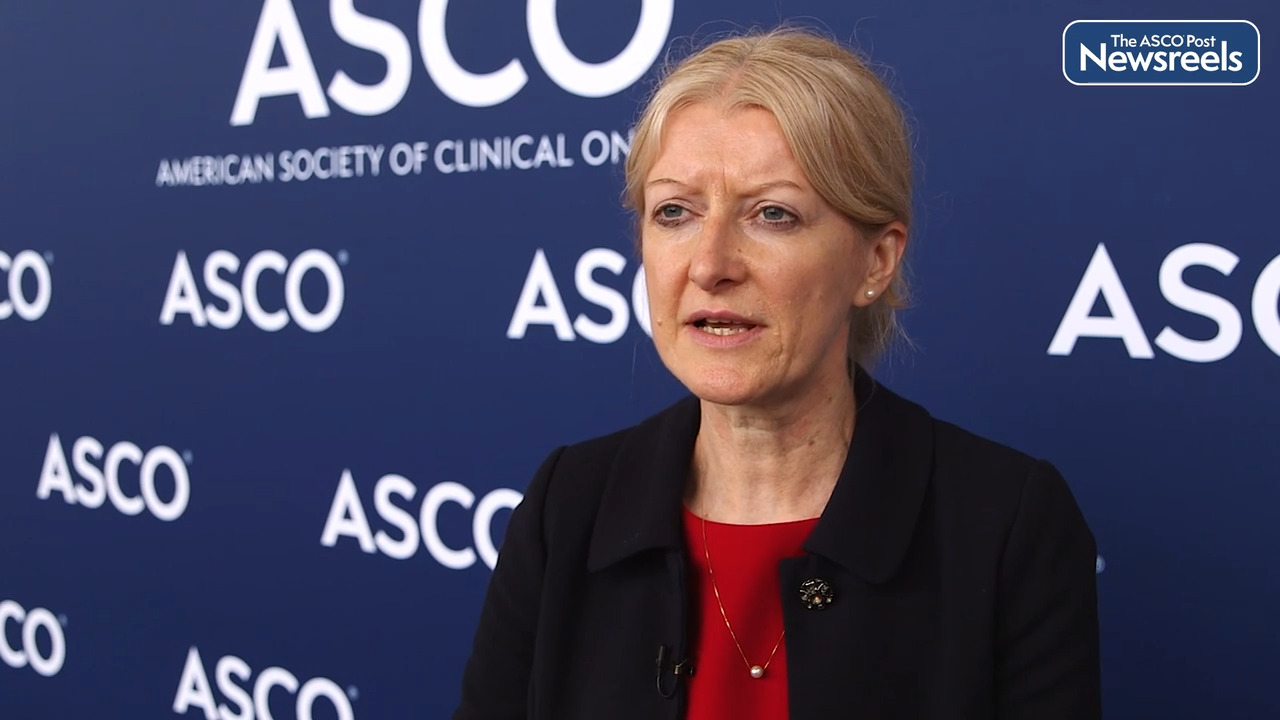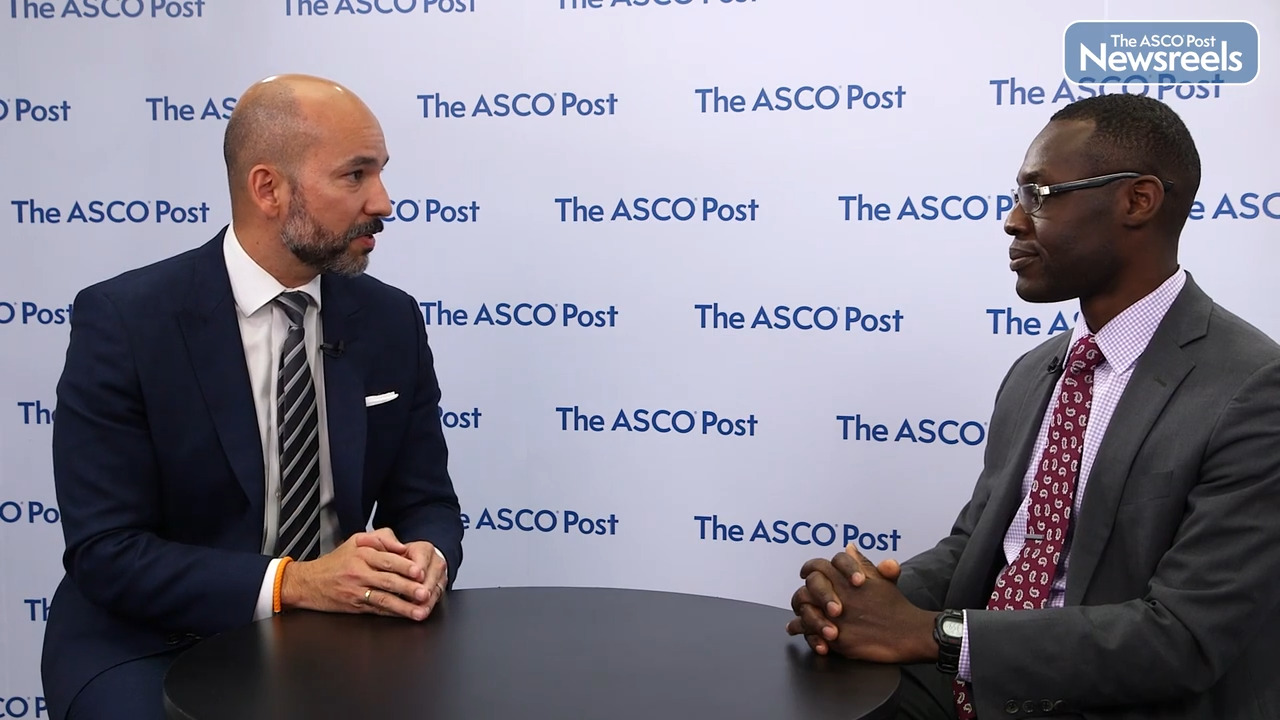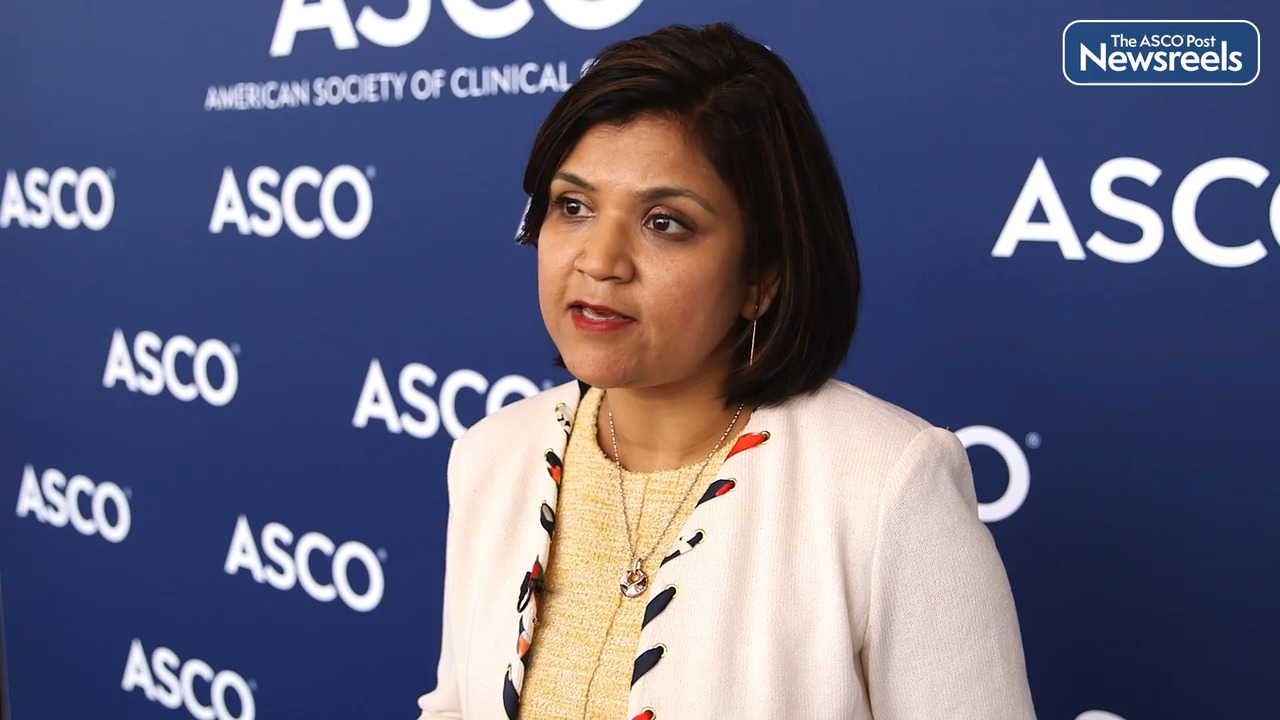Sumanta K. Pal, MD, on Urothelial Carcinoma: New Results on Cabozantinib Plus Atezolizumab
2022 ASCO Annual Meeting
Sumanta K. Pal, MD, of City of Hope National Medical Center, discusses findings from the COSMIC-021 study, which showed that cabozantinib plus atezolizumab demonstrated encouraging clinical activity with manageable toxicity in patients with inoperable locally advanced or metastatic urothelial carcinoma. The combination was administered as first-line therapy in cisplatin-based chemotherapy–eligible and –ineligible patients and as second- or later-line treatment in those who received prior immune checkpoint inhibitors (Abstract 4504).
Transcript
Disclaimer: This video transcript has not been proofread or edited and may contain errors.
The COSMIC-021 study is a trial that includes multiple different histologies, multiple different cohorts. At this year's ASCO meeting, ASCO 2022, I presented data pertaining to cohorts three, four, and five. This specifically looked at patients with advanced urothelial carcinoma. The composition of each of the cohorts was distinct. In cohort three, we had patients that were cisplatin-ineligible. In cohort four, patients that were cisplatin-eligible. And finally, in cohort five, patients that had received prior immune checkpoint inhibitors. What ultimately it boiled down to is about 30 patients per cohort. In terms of the distribution of patients, it was predominantly male, as you might expect. Most of the patients had a bladder primary, although we did actually have good representation of upper track tumors, ureteral tumors, and so forth. That was about 30% of the study population. Amongst those patients that had received prior immune checkpoint inhibitors, about 30% had received one prior therapy implying immune-based treatment, and about 68% had received two or more prior lines of treatment. What we saw was actually a graded response. In patients who were cisplatin-eligible we saw the highest response rate, 30%. In patients that cisplatin-ineligible we saw a response rate of 20%. And finally, in patients that had received prior immune checkpoint inhibitors, we saw a response rate of 10%. It's always tricky to know what endpoints to follow in these relatively small studies. One thing that really I found intriguing was the duration of response. And with substantial follow up at this point in time, we still haven't reached the median duration of response amongst those patients that were cisplatin-eligible. I really think that the toxicity profile that we saw in this study really mimics what we've seen in other experiences of cabozantinib with atezolizumab. The combination seems to be very well tolerated. We used a dose of cabozantinib at 40 milligrams. The rates of hepatitis, the rates of other toxicities that you'd expect with a combination like diarrhea, were very reasonable and manageable by and large. So in summary, I think that this combination really does have activity. My hope is that we'll be able to study it further in certain contexts. And in particular, there's a study ongoing right now that I'll plug, MAIN-CAV through the Alliance. It's led by Dr. Shilpa Gupta. This trial I think is a prime way for us to understand the role of cabozantinib with immunotherapy where that combination's being assessed in the maintenance setting.
Related Videos
The ASCO Post Staff
Carryn M. Anderson, MD, of the University of Iowa Hospital, discusses phase III results of the ROMAN trial of avasopasem manganese for patients with severe oral mucositis who are receiving chemoradiotherapy for locally advanced, nonmetastatic head and neck cancer. Compared with placebo, avasopasem manganese improved severe oral mucositis (Abstract 6005).
The ASCO Post Staff
Alicia K. Morgans, MD, MPH, of Dana-Farber Cancer Institute, and Michael S. Hofman, MBBS, of Peter MacCallum Cancer Centre, University of Melbourne, discuss follow-up results on LuPSMA vs cabazitaxel in patients with metastatic castration-resistant prostate cancer progressing after docetaxel treatment. The findings suggest that LuPSMA is a suitable option for this population, with fewer adverse events, higher response rates, improved patient-reported outcomes, and similar overall survival compared with cabazitaxel (Abstract 5000).
The ASCO Post Staff
Mairéad G. McNamara, PhD, MBBCh, of The Christie NHS Foundation Trust, discusses phase II findings of the NET-02 trial, which explored an unmet need in the second-line treatment of patients with progressive, poorly differentiated extrapulmonary neuroendocrine carcinoma. In the trial, the combination of liposomal irinotecan, fluorouracil, and folinic acid, but not docetaxel, met the primary endpoint of 6-month progression-free survival rate (Abstract 4005).
The ASCO Post Staff
Gilberto de Lima Lopes, Jr, MD, MBA, of Sylvester Comprehensive Cancer Center at the University of Miami, and Oladimeji Akinboro, MD, MPH, of the U.S. Food and Drug Administration (FDA), discuss a data analysis, which suggests that most subgroups of patients with advanced non–small cell lung cancer with a PD-L1 score of 50% or greater who are receiving FDA-approved chemotherapy/immunotherapy regimens may have overall survival outcomes comparable to or better than immunotherapy-alone regimens (Abstract 9000).
The ASCO Post Staff
Shilpa Gupta, MD, of the Cleveland Clinic Foundation, discusses an updated consensus definition for standard therapy and clinical trial eligibility for patients with metastatic urothelial cancer who are platinum-ineligible, criteria that are proposed to guide treatment recommendations for this population. This may be especially important now that the U.S. Food and Drug Administration has restricted the use of first-line pembrolizumab to those who are considered platinum-ineligible (Abstract 4577).





